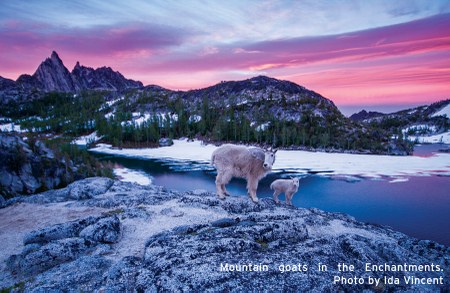
Katherine Hollis, Mountaineers Director of Conservation
To truly care about something, it has to have impacted you intimately. It’s that personal connection that gives us the impetus to act.
While everyone can agree that cancer is terrible, it often takes having a friend or family member fight it for someone to get involved in supporting research. While many people might agree with the idea of bike lanes, it usually takes attempting to be a regular bike commuter to engage in advocacy on city bike paths. One of the most important things we do as Mountaineers is inspire people to love the outdoors. Since you can only love what you know, the Mountaineers works to get people of all ages outside into nature. We connect people with the outdoors to support the physical, emotional and social benefits of a healthy active outdoor lifestyle and because successful conservation depends on these connections. We work to protect the places that inspire, excite and challenge us and leave them better than when we arrived, because we know our way of life depends on others experiencing that same wonder and joy.
What it is about our experiences outdoors that make us care?
My former colleague, Mary Hsue, shared this bit about type two fun, and how these types of experiences outdoors create that intimate connection with the natural world.
Within my first few years of climbing, I found myself with three others on a one-day climb of Mt. Stuart’s West Ridge, struggling to keep up with the fast-pace, battling mosquitoes and working hard to manage my fear of exposure. We’d been going for 13 hours non-stop, and the trailhead felt many hours away. It was not fun. I told myself over and over that I would NEVER do this climb EVER AGAIN. And yet a week later, I described the climb as “not bad”, and actually asked my climbing partner if he thought we could do the more challenging North Ridge in a day. The climb was fun. Or maybe more accurately, it is fun to consider in retrospect: this is quintessential “Type II, bordering on Type III fun”. With this sort of fun, you would rather break a limb and be airlifted out than to move forward. It’s only later, after you realize that the only direction you can move is forward – where there exists a chance to accomplish something unimaginable – that you would even think to call it fun. Type II or III fun involves suffering in the process, but the experience usually builds character, and the rewards have the potential to course through the rest of your life.
These experiences also build connections to our awe-inspiring natural places.
The other thing about my breakthrough on Mt. Stuart is that when I got to the top of the Long’s Pass I stopped and turned around to look back at the mountain, at that moment being kissed by the setting sun’s rays. My first thought was “I climbed THAT?” which was immediately followed by a sense of awe and appreciation for the mountain that played a significant role in my experience. I think about it today and can see it like it was yesterday. This is an image that will be forever burned in my memory. Mt. Stuart, Long’s Pass and Bean Peak trail are places I’m connected to because these places made this breakthrough possible.
This kind of powerful outdoor experience is what The Mountaineers has provided for adults for over a century. And we have made remarkable progress in giving the same to youth – particularly for those youth who would not otherwise have these opportunities. These “aha” moments that our programs help make, create connections and people who care about the persistent issues and threats to the natural world. Type-two fun inspires us to become protectors of these places.
The Mountaineers is also uniquely positioned to create a modern voice in public lands conservation through our younger members, like Sarah, a member of our Mountaineers Adventure Club. During her three years as a MAC member, Sarah shares that she’s met people will be lifelong friends and done things she never imagined she could do.
From the trailhead to the peak, I kept doubting myself and my capabilities. I wasn’t paying attention to my surroundings or the people I was with. My body was capable, but my mind started to psyche me out. The only thing that kept me going was the fact that I needed to keep on going for my group. I did not want to be the weak link. The reality that what we were doing was real and had risk was magnified as I scrambled on the peak, leaning forward to keep my balance, hunched over making big moves, and using a hand-line for protection. And all the while, I thought “I am by myself.” It’s just me and Sahale. When I saw two teammates sitting on top of the summit waiting for me, I was overwhelmed with happiness and relief – elated to be so close to my goal.
I will never forget the gratitude I gained for Sahale.
Because it’s that Sahale trip that boosted my confidence for the rest of that year. And to this day, I meet challenges in school, at my new job at REI, and in my personal life with a new passion and a new level of unshakeable confidence. I owe this confidence to Sahale. In return for that gift, I promise to protect Sahale.
Through her immediate, personal experience in wilderness, Sarah has become one of its fiercest protectors. Whether planting trees, summiting Rainier or paddling the Columbia river we provide these experiences every day to every type of adventurer. This is our voice: The Mountaineers protects the outdoor experience.
 Katherine Hollis
Katherine Hollis